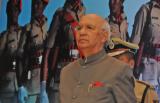 Bangalore, Jul 9: Governor H?R?Bhardwaj has given his assent to a land revenue bill that proposes to regularise unauthorised houses built by the poor on government land in rural areas.
Bangalore, Jul 9: Governor H?R?Bhardwaj has given his assent to a land revenue bill that proposes to regularise unauthorised houses built by the poor on government land in rural areas.
The controversial Karnataka Land Revenue (Amendment) Bill was first passed during the tenure of the Bharatiya Janata Party (BJP)?government by both houses of the state legislature in June last year, but was returned by the governor in September for reconsideration, stating that the legislation would not serve any public good or social cause and could lead to illegal grabbing of government land.
However, the government got the Bill passed once again during the Belgaum session of the legislature in December last year. The assent was given on Saturday, sources said.
The governor had not given his assent to the bill for nearly a year. The Congress, while in the Opposition, had strongly opposed the regularisation of illegalities on various grounds.
The amendment to the bill sought to substitute Section 94C of the Karnataka Land Revenue Act, 1964, paving the way for grant of government land occupied in an unauthorised manner by persons in rural areas who have built dwelling houses prior to January 1, 2012. Only BPL families who do not possess any other house were proposed to be eligible for the scheme.
A similar bill, again initiated by the BJP?government, this time to regularise unauthorised houses built by the poor on government land in urban areas, was returned by the governor in March.
In a related development, the state government has entrusted a legal team to work on the regularisation of unauthorised construction and development like violation of by-laws or floor-area ratio in urban areas, popularly known as the Sakrama scheme, to prepare its provision so that its “people-friendly” and at the same time in accordance with the law.





Comments
Add new comment